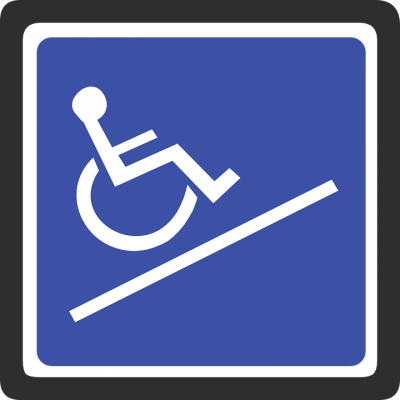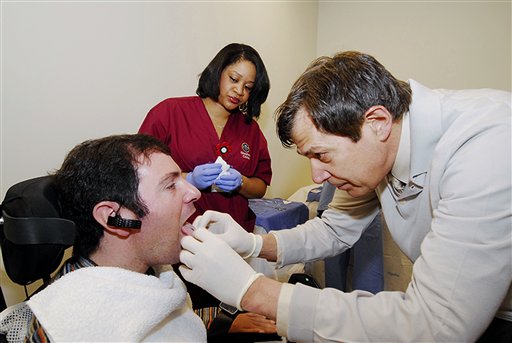 Researchers in Washington have developed a new device to help the paralyzed maneuver their wheel chairs, and have found wonderful success. First published in the journal Science Translational Medicine, research teams in Atlanta, Chicago, and Washington have developed a metallic stud that doubles as a tongue piercing which individuals utilize to maneuver their wheelchairs. Out of the participants, all completely disabled volunteers preferred the device over their other assistive systems.
Researchers in Washington have developed a new device to help the paralyzed maneuver their wheel chairs, and have found wonderful success. First published in the journal Science Translational Medicine, research teams in Atlanta, Chicago, and Washington have developed a metallic stud that doubles as a tongue piercing which individuals utilize to maneuver their wheelchairs. Out of the participants, all completely disabled volunteers preferred the device over their other assistive systems.
“For people who have very limited ability to control a power wheelchair, there aren’t that many options,” said Dr. Brad Dicianno, a rehabilitation specialist at the University of Pittsburgh Medical Center who wasn’t involved with the new research which is one of the reasons these findings are incredibly exciting.
The study asked 11 disabled and 23 able bodied individuals to participate. Only the 11 voluntary and completely paralyzed patients instantly embraced the new device; stating they preferred the tongue system more due to the accurate maneuvering as well as faster operating times for the chair. The device primarily works via a sensor that calculates the tongues position and transmits signals to a smart phone located on the individual. The signals are received via an app developed by researchers and subsequently contact the wheelchairs computer system which tells the chair where to go.
While, most paralyzed individuals use a straw administrative system (know as the sip-and-puff system) that calculates speed and records turning indicators; individuals said the tongue piercing was well worth the pain to get rid of the straw. James DiSanto, 39, who is paralyzed due to a spinal cord-injury, stated the piercing took a little while to get used to- especially when eating- but was easy to adjust to and learn how to control the chair.
Participants were asked to drive their chair through a course full of obstacles both physical and virtual. On average they performed three times better with the tongue piercing on virtual games (like computer or video game tests) then they did with the sip-and-puff system. Additionally, the tongue has one of the largest sensory systems, second only to the hands, which helps the participants endurance and ability to go large amounts of time with control over their wheel chair, since the tongue rarely gets tired. The tongue is simply, “unobstrusive, easy to use and flexible,” says Maysam Ghovanloo, a biomedical engineer who created the system and has started a company that is working with Georgia Tech to commercialize it.
Due to the early trials and federal regulation, the device was only able to test inside laboratories and will require much more research and testing before it will become a permanent option for paralyzed individuals. Specialist have high hopes for the machine which they are hoping could be developed and implemented into cars and other modes of transportation to give the paralyzed another chance of mobility. Additionally, developments are being looked into by Ghavanloo and his team to provide the disabled the ability to turn on and off lights, televisions, and other electronic devices they might not have been able to previously.
Out of the participants, ten dropped out due to various reasons unassociated with the tongue piercing itself. Many had a hard time arriving to the study, as well as unrelated medical issues, as well as loss of interest. Only one tongue piercing fell out while in the midst of the study. Researches also cited that while all disabled individuals instantly approved the device, the 23 other individuals were quick to hop on the train for the product.
There seems to be only one problem with the device; the perception of tongue piercings. This stigma is what primarily drove older participants away from the study, stating a tongue stud wasn’t acceptable in their profession and it would not be conducive to their lifestyle. However, to DiSanto it makes little difference. “Somebody that’s in a wheelchair already has a stigma,” he said. “If there was something that could be developed to control my wheelchair and the environment around me, to make me more independent without having to have medical devices coming out of my mouth, it would be a huge benefit.”
We at Good Guys Injury Law recognize the benefits of such technology for those disabled. Many of these individuals were not born disabled and have experienced a tremendous amount of loss of life since their disablement. This new technology gives them the chance to regain the mobility they have lost without inconveniencing the others around them, and as some researchers say, could radically change the outlook for those disabled. If you have been injured and are paralyzed due to someone else’s negligence, do not hesitate to contact us at our Draper office for a free confidential consultation. Do not let the medical bills or the loss of mobility plague you for longer than it should. You may reach us by calling (801) 506-0800.
